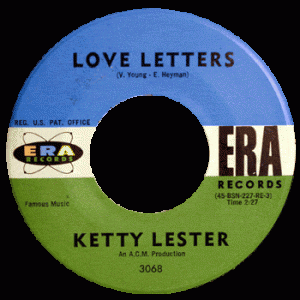
 I do most of my writing at home and I’m usually busy on Mondays and Tuesdays writing stories for the local weekly newspaper. By Wednesday, which is when I write this column, I’m usually feeling the need to get out. I tried coffee houses for awhile, but lately I’ve been grabbing my laptop and heading for the Newport, RI Public Library. It seems to work for me.
I do most of my writing at home and I’m usually busy on Mondays and Tuesdays writing stories for the local weekly newspaper. By Wednesday, which is when I write this column, I’m usually feeling the need to get out. I tried coffee houses for awhile, but lately I’ve been grabbing my laptop and heading for the Newport, RI Public Library. It seems to work for me.
As I was headed into the library this morning it occurred to me that I know very little about this week’s featured artist. Oh sure, I’m familiar with her big hit, but that’s about it. That’s when it dawned on me that one of the things that I like most about writing Soul Serenade is that it gives me the opportunity to learn more about the people who made the music that I love. Hopefully, reading the column gives you a little insight into these people as well.
This week let’s learn about Ketty Lester. Have you ever wondered what Ketty Lester and Bill Clinton have in common? Me neither. The answer however is that they were both born in Hope, AR. Ketty was born there in 1934, and she was one of 15 children born into a farm family. Her given name was Revoyda Frierson, but that had to go.
By the time she was 21 Ketty had won a scholarship and moved to San Francisco to go to nursing school. She sang in the church choir, and did some summer stock theater. Not only did she share a hometown with Bill Clinton, she shared a moment with Groucho Marx too, appearing on his ’50s game show You Bet Your Life.
Eventually Ketty was introduced to producers Ed Cobb and Lincoln Mayorga, and signed to Era. Her first single for the label was released in 1961 with “I’m A Fool To Want You” on the A-side, and “Love Letters” on the other side. DJs liked the B-side better however, and flipped the record over. “Love Letters” had been a hit for crooner Dick Haymes in 1945.
The song is driven by Ketty’s smoky vocal, a sparse piano arrangement, and the great Earl Palmer on drums. By early 1962 “Love Letters” was at #5 on the Billboard Hot 100, and #2 on the R&B chart. The record sold over a million copies, and when the RIAA compiled their list of the Songs of the Century in 1991, “Love Letters” was there at #176.
Ketty’s followup, a cover of the Gershwin brothers’ “But Not For Me” didn’t do as well, only reaching #41 on the Pop chart. Subsequent singles didn’t even fare that well, and by 1964 Ketty had left Era for RCA. Unfortunately her singles for the label didn’t meet with much success. She did win a Theatre World award however for her performance in the off-Broadway play Cabin In the Sky during that time period.
Ketty moved on to the Tower Records label. While there she released an answer record to Percy Sledge’s “When A Man Loves A Woman” called “When A Woman Loves A Man,” but it was not a success for her. Subsequent singles for the Pete label failed to make much of a dent.
By the late ’60s Ketty had pretty much given up singing and turned to acting. She appeared in several ’70s movies including Blacula, Uptown Saturday Night, and The Prisoner of Second Avenue. She spent two years on the soap opera Days of Our Lives, and then had a good run on Little House on the Prairie, playing Hester-Sue Terhune. In 1994 she appeared in House Party 3.
Ketty Lester only had one big hit. She was far from a one-hit wonder however because she never really vanished from public view as so many of the artists behind those hits do. When the music stopped, she built a very respectable career as an actress, and we’ll always have the indelible “Love Letters” to listen to.
[youtube id=”uhpNxlQsABM” width=”600″ height=”350″]




Comments